Russia and the new nineteenth century
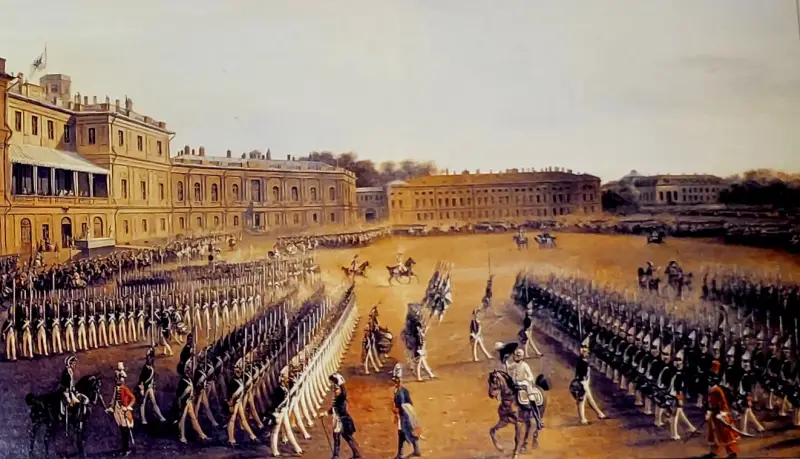
Drills of Paul I according to the Prussian model in Gatchina. Hood. G. Schwartz
The article talks about what happened in stories Russia at the beginning of the 19th century. It continues the series of articles about the stages of the country’s development associated with formations.
The Russian feudal class, the nobles, received at the beginning of the 18th century. modern technologies, both in control and in weapons, were able to prove themselves on the battlefield.
The other side of the coin was the attitude of the feudal officers towards the peasant soldiers, most often as serfs with all the feudal disdain for the mob, losses in the war and their exploitation as serfs. With rare exceptions, as under Suvorov with his “miracle heroes” who selflessly believed in their leader, this situation persisted in the army for the entire remaining feudal and post-feudal period.
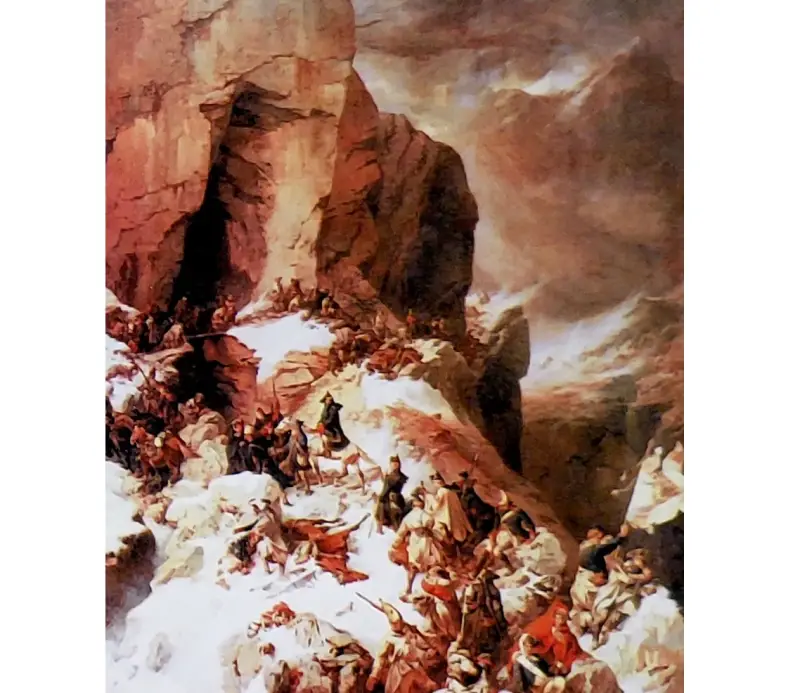
Suvorov's crossing of the Paniks ridge 1799 Hood. A. Kotzebue
Russian feudal lords at war
Work on the compliance of the Russian military system with external challenges, begun under Peter I, did not stop: until the 50s. it was the influence of the imperial, Austrian military system, from the 50s - Prussian, and from the end of the XNUMXth century. - French. The rational approach, rational thinking, necessary for the formation of a modern army, was in conflict with the feudal mentality.
Rational thinking was a product of developments associated with science and technology, primarily in Western Europe. The rationalism of the ancient Greeks and Romans, including in military affairs, was completely forgotten and revived during the Renaissance, which marked the beginning of the end of feudalism and the agrarian thinking associated with it.
This process took place throughout Europe, where the strength of feudal relations based on the dominance of agricultural production played an even more important role. Neither the peasant who cultivates the land using the “technologies” of his ancestors, nor the knight who performs feats in war, in tournaments and against dragons, needs rational thinking, and there is nowhere for it to come from.
Rationalism in feudal Europe arose with the development of cities, as the antipodes of the countryside, in the 1767th century. This was a similar situation in Russia, but in the 1768th century. The rational approach primarily covers the upper stratum of the nobility, because the teaching of sciences has already taken place here for more than one generation. It is significant that in one of the orders of the period of the Statutory Commission of XNUMX-XNUMX. nobles of Belevsky district wrote:
Even after the reforms of Tsar Peter, the Russian army needed European officers and specialists, for example, Prussians to train the army in new tactics, or foreign military engineers who retired in their homeland (Decree of 1730). The creation of the first military school - the Land Noble Cadet Corps in 1731 took place under the leadership of Prussian officers and non-commissioned officers, who were sent by the “soldier king” Friedrich Wilhelm I (1688–1740).
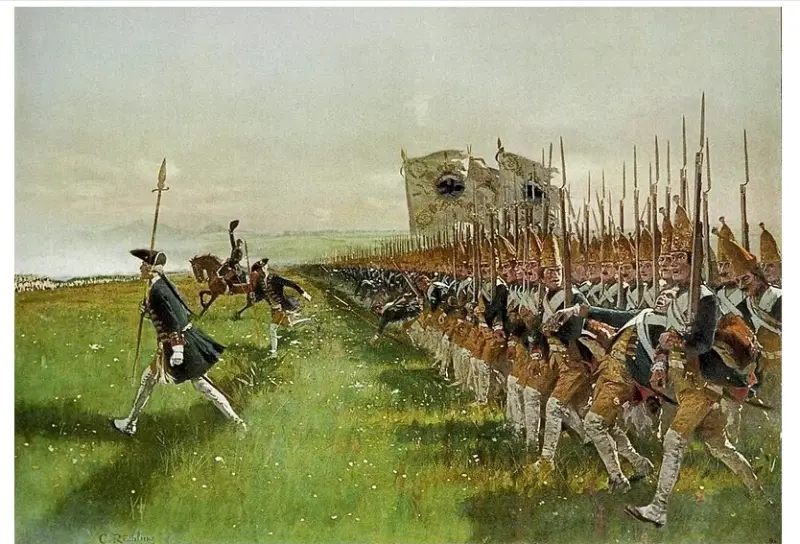
Prussian infantry attack 1745 Hood. K. Reichling
A. A. Arakcheev reformed the Russian artillery, an equestrian park, created artillery schools by order of Alexander I and... under the influence of the military genius and artilleryman Napoleon, however, as elsewhere in Europe. Despite enormous efforts to maintain technology, Russian small arms were inferior to European models, and the supply of the army, for example with fabrics, left much to be desired.
The firmness and courage of the Russian troops was associated not with the mythical “eternal fortitude of the Russians,” but with the class of feudal warriors, multiplied by modern borrowed technologies.
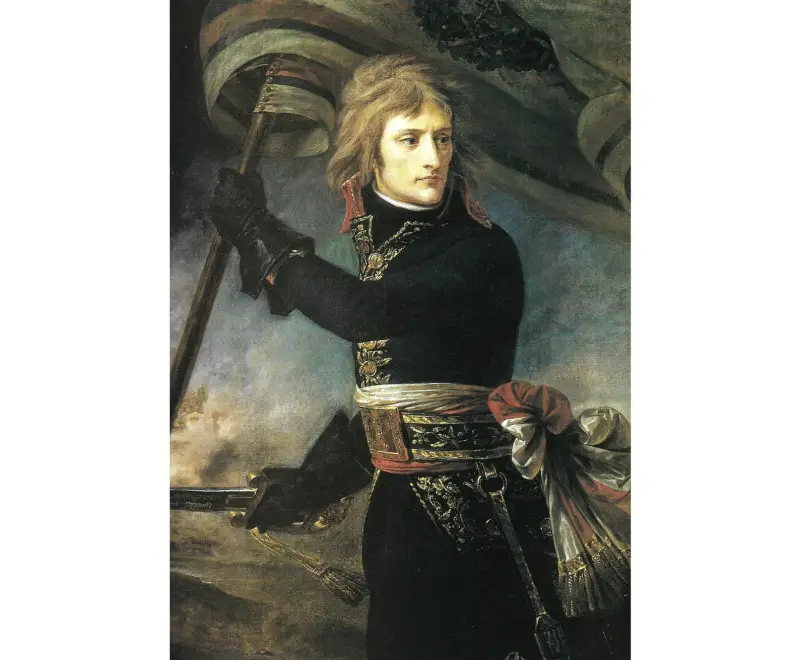
Bonaparte on the Arcole Bridge November 17, 1796 Hood. Antoine-Jean Gros
“Or maybe a knock on the door?”
In the wars with Turkey and its allies, in the fight against Polish and other rebels, nomads of Siberia, and even with Sweden after 1721, the result was achieved thanks to the leadership and organizational talents of Russian military commanders, among whom P. S. Saltykov, P. A. stood out. Rumyantsev, G. A. Potemkin, and, of course, A. V. Suvorov. The autonomy of such “heroes”, who acted contrary to the charters and regulations, was welcomed in the “golden age of the nobility” and was completely natural in the conditions of the feudal mentality of “decentralized balance”.
But the martinet emperor Pavel, possessed by the “demon of the parade ground,” like both of his reigning sons, on the one hand, could not discern this important quality acquired by the Russian army during past wars. But, on the other hand, his concerns about the problems with such an army conducting combat operations in Europe were not in vain. Management problems were compensated by the courage and resilience of soldiers and officers: the feudal mentality came into conflict with rational management systems that were gaining strength. Simply put, Suvorov’s ability to fight against any enemy could not be cloned and scaled to all troops, because it was not a combat system created by Suvorov, but the personal skills of a military genius. Who, by the way, was a fan of the “Prussian system”, but not the “Prussians”. And this is always the key difference between a system and personal skill.
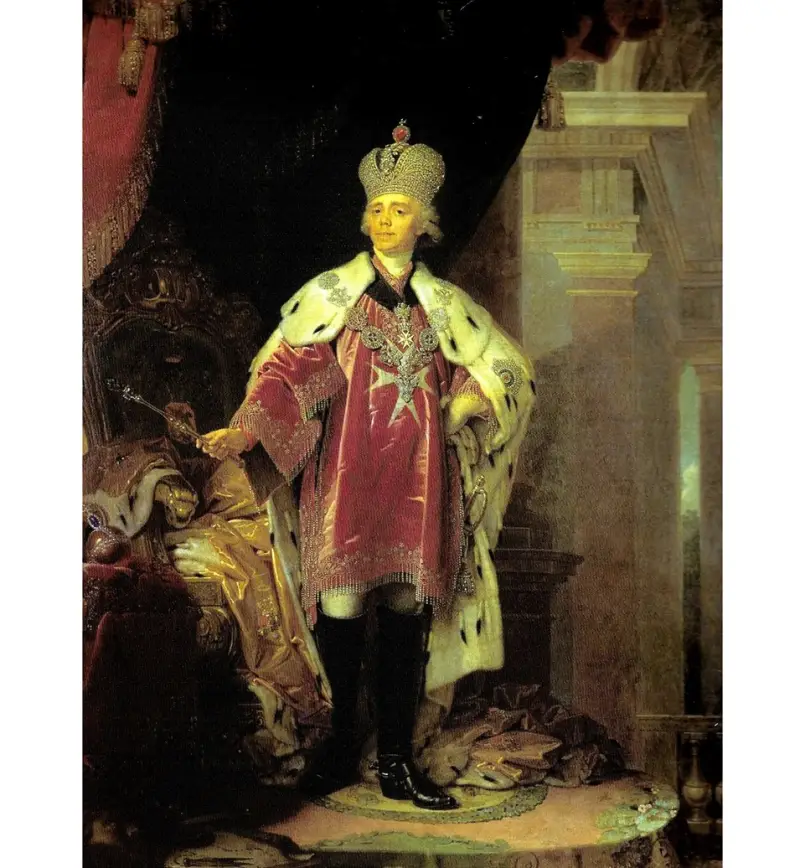
Paul I in the vestments of the Grand Master of the Order of St. John. Hood. V. Borovikovsky
Feudal Russia met the new pan-European threat created by the Great French Bourgeois Revolution (1789-1799) with the Tsar-Knight Pavel Petrovich at its head. Which is very symbolic for the stage of development of the country, where feudalism was in full bloom and did not even reach its culmination, as in Europe, relatively speaking, in the XNUMXth or XNUMXth centuries. Pavel, who had read a lot of knightly novels, built a castle painted in the color of the glove of his beautiful lady, Anna Lopukhina-Gagarina, and designed “knightly” ceremonies and rules of knightly behavior that were appropriate in the Middle Ages, and not in the XNUMXth century.
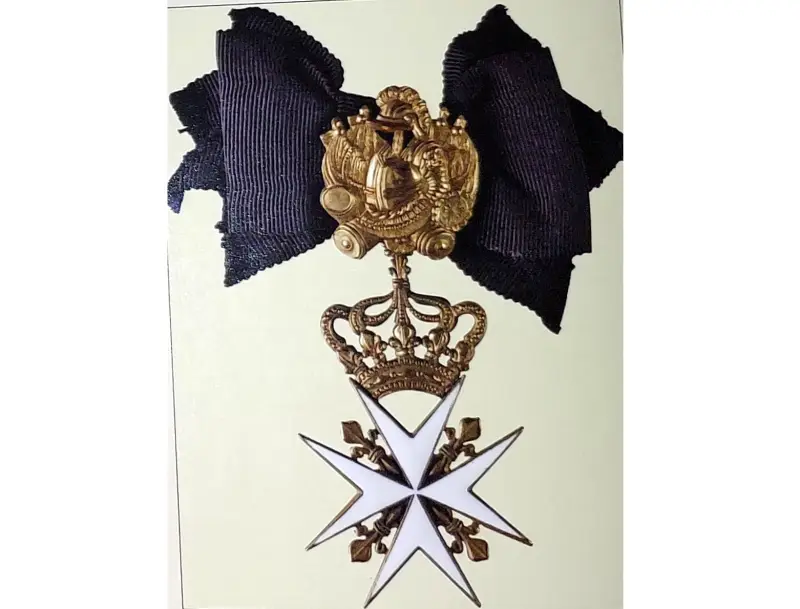
Order of St. John, Maltese cross
The Tsar Knight and the Feudal Freemen
In the face of new external threats, the patron king of the knightly order of St. John of Jerusalem decided to bring into shape his, in fact, feudal army, which, in his opinion, had become loose from the “good life” under Catherine II. He could only do this using foreign patterns and samples, in his case Prussian ones. But because of his personal psychological qualities, formalism and psychopathy, solutions to these problems acquired caricatured forms, which the “feudal freemen”, alien to change, took advantage of:
You are with Frederick the Second,
Manage as you wish,
Don Quixote is just in front of him!
Paul demanded that the nobility change their attitude towards military discipline; in fact, he restored compulsory military service for everyone, fought against drunkenness and card games, abolished the practice of enrolling in regiments from the cradle, and achieved uniformity in uniforms and commands for all troops:
The emperor brought order to the guard: 1541 fictitious officers were expelled from the horse guard alone. Up to 50 thousand soldiers were “dispersed” to work on the estates of feudal commanders. He reduced the army from 500 thousand to 335 thousand, but increased the payment of salaries. This was finally demanded by his mother’s upset military enterprises and the country’s finances, which needed to be put in order in the face of new threats. It is significant that in 1808 A. A. Arakcheev, also a Maltese cavalier, and after him Barclay de Tolly in 1811 under Alexander I, again had to use harsh methods to restore discipline among the noble officers.
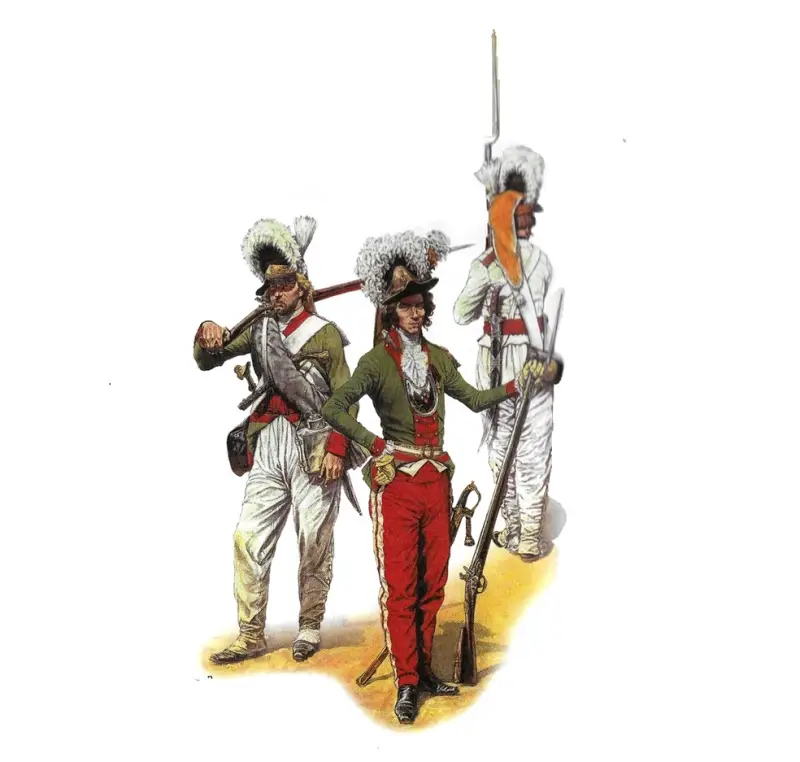
Officer and grenadiers of the Primorye Grenadier Regiment, 1790s. gg.
But all this was just the outer shell. Europeanized and modernized for modern warfare, the Russian nobility considered the hardships of service natural, and serving the monarch was their moral and Christian duty, as in any country of “classical” feudalism:
I was born for royal service!
Saber, vodka, hussar’s horse,
I have a golden age with you!
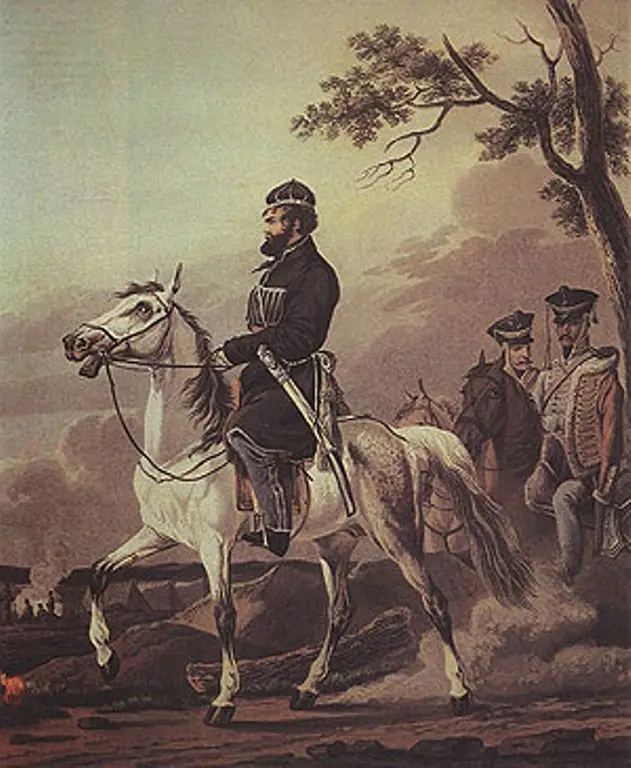
Denis Davydov, the author of these lines, was a vivid personification of “knightly” prowess, although he dressed in the fashion of the 19th century. Denis Davydov. Hood. A. Orlovsky
But the “strange” actions of the emperor in relation to their “baptized property” caused concern among the nobles. Although Paul's goal was an attempt to “normalize” the economic activities of the nobles, as he understood it. And not the abolition of the “serf system” by the king, who distributed 550 thousand serfs. But the swearing in of peasants, the reduction of the period of conscription, the transfer of arrears of peasants to their nobles (!), the prohibition of the sale of servants and peasants without land, the Manifesto of 1797, which defined corvée in three days, led to the fact that he, through the hands of high-ranking conspirators , was “balloted” and brutally killed. The nobles, who remained “caring” serf owners towards the peasants, did not allow tyranny on the part of their monarch.
Mission is impossible?
And here we must return to the historical mission associated with the emergence of feudalism in Rus'/Rus in the 1761th century. This military organization of an agrarian society was intended to protect the country from external threats. And it was primarily about the fight against the nomads, and secondly, against the western neighbor, who had seized the southern and western lands of the former Ancient Rus'. And this mission of the feudal military organization, of course - very conditionally, was completed by the end of the 1762th century. Peter III, looking ahead, even allowed the nobles not to serve already in 1785, which was confirmed by Catherine II in XNUMX, and just in case - in the Charter of the Nobles of XNUMX. In fact, the procedure for leaving service was practically impossible. But that’s not the point, it’s that the system was coming to its logical end. And as V. O. Klyuchevsky wittily noted:
As we see, the question of freeing the peasants from serfdom, which by this time had turned them into the personal property of the nobles, and not, as was the case at the initial stage, attached to the land property of the servant, became the subject of reforms starting with the accession to the throne of Alexander I and the beginning of work The secret committee since 1801. It so happened that historical justice demanded “freedom” for the peasants, and the tsar was a sincere opponent of serfdom. But... the example of his recently murdered father, who did not even think about any liberation, held him back. Therefore, in the spirit of the times, with the hope of the consciousness of the noble class, a “non-binding” Decree on free cultivators was issued on February 20, 1803. From 1803 to 1825, 47 male souls were freed under this law: of these, 153 were released by one owner, prince and favorite of the tsar A. N. Golitsyn, who received a ransom from the treasury.
System and control
And management, in conditions of a possible weakening of the police power of the landowners, required a different structure and different training for managers. In Prussia, which was significantly inferior to Russia both in area and in population, in 1763 the number of officials was slightly less than in Russia, and their quality was much higher. At the beginning of the 5th century. in Russia there was actually only one university in Moscow, only 1825% of the total population received primary and secondary education, when in 13,14 this figure was already XNUMX%. Under Alexander and his younger brother, a huge number of higher institutions and gymnasiums were opened, which were supposed to produce competent officials for management. And the reform entrusted to M. M. Speransky, the same book-reading bureaucrat like Arakcheev, but without his cruelty, was supposed to lead to a new “modernization” of Russia. A European country, in the opinion of the reformer, but due to its administrative uniqueness, it had a certain backwardness, which was planned to be eliminated through a formal reorganization of the state system. management, which was based on the ideas of the Enlightenment during the French absolute monarchy, because
But in a “classical” feudal country it couldn’t have been any other way! And the point here is not in Russian specifics, but in the stage of development of society.
What remained from the speculative reform dedicated to the separation of powers and the strong power of the monarch, not connected with the realities of the feudal country, were ministries as organic structures of the management system in areas of activity in the conditions of increasingly complex connections in society and... another “Duma under the Tsar,” the State Council.
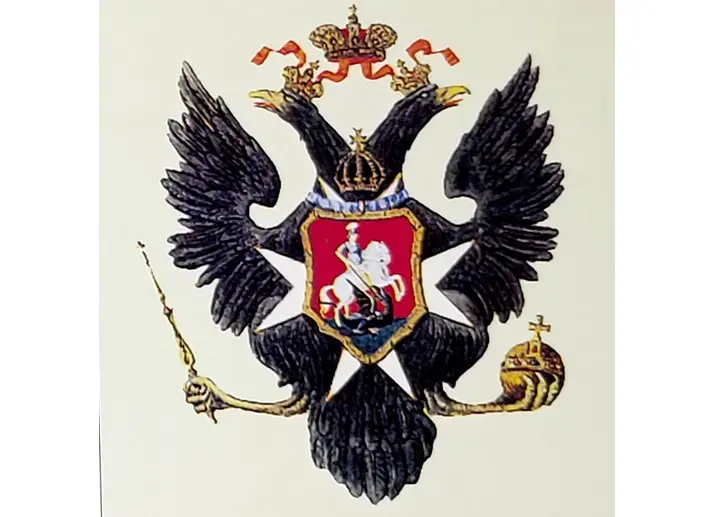
Coat of arms of Russia under Paul I
The idea of liberating the peasants, associated with the restructuring of government, was in blatant contradiction with the desire and vision of the ruling class, the nobles. Alexander I was loved by the guards and the army, but his “liberal” ideas, inspired by the Enlightenment, in a feudal country were good as salon conversations, “without hesitation in conversation, lightly touch on everything,” but not for implementation.
He himself remained an example of a Russian landowner, courteous with foreign guests and subjects, and a tyrant with his subordinates.
And harsh reality forced the Russian feudal state to directly participate in the fight against the “Jacobin threat” of Bonaparte.
With the fall of the Bastille, the “golden age of the nobility” ended both in Russia and throughout Europe; new times were coming, creating new challenges, regardless of individuals and rulers.
To be continued ...
Information